
different shoes:
The report on empathy in our industry
86% OF INDIVIDUALS BELIEVE THAT EMPATHY IS IMPORTANT IN THEIR ORGANISATION, HOWEVER ONLY 38% BELIEVE THEIR EMPLOYER VALUES EMPATHY.
Following on from the 2020 Mentally Healthy Survey, the industry told us what was needed to create more mentally healthy workplaces – more empathetic leaders. To investigate the levels of empathy in the industry we surveyed more than 500 people across creative, media, marketing, digital, PR and publishing backgrounds. We also carried out interviews with key industry leaders to gather their perspectives on the topic. Creatives accounted for 44% of respondents, 21% media, 12% marketing and 11% digital.You can watch the replay of our launch event here.
DEFINING EMPATHY
When we asked respondents how they define empathy, understanding was the word used. To put empathy very simply, at its essence, it really is about understanding and sharing the feelings of others (Oxford Languages 2022). However, participants went much further with their own definitions of empathy and how they’d like it to be shared.
Further definitions included:
“the ability to relate to another person's experience without imposing your own judgement or values on it.”
“Empathy is about being able to step into the shoes of others, to experience the feelings and emotions they have and understand the complexity of what they face.”
“The ability to look at things from a different perspective and to think about how others are feeling, and if what I am saying or doing is going to affect them (in a good or bad way).”
What is Empathy?
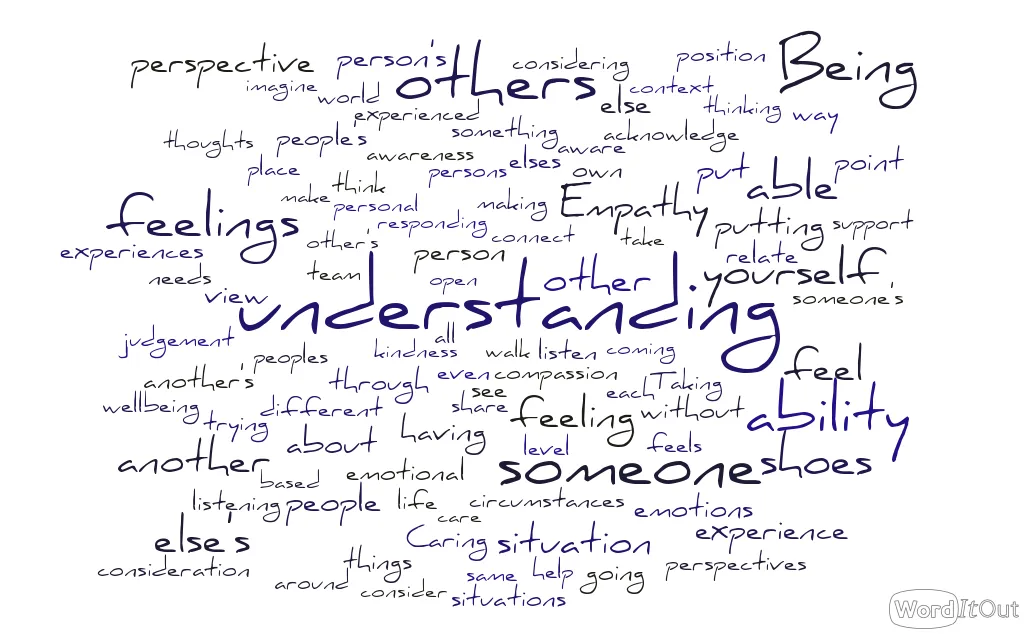
Source: The Empathy Project, Q9: In your own words, how would you describe ‘empathy’?
THE IMPACT OF EMPATHY IN THE WORKPLACE
When we think about what makes a thriving workplace, things that come to mind might include collaboration between teams, job satisfaction and an inclusive work culture. These also happen to be the top three benefits of an empathetic workplace, in order of importance, as nominated by the respondents. The other top responses included lower staff turnover, better creative output and more rewarding work.
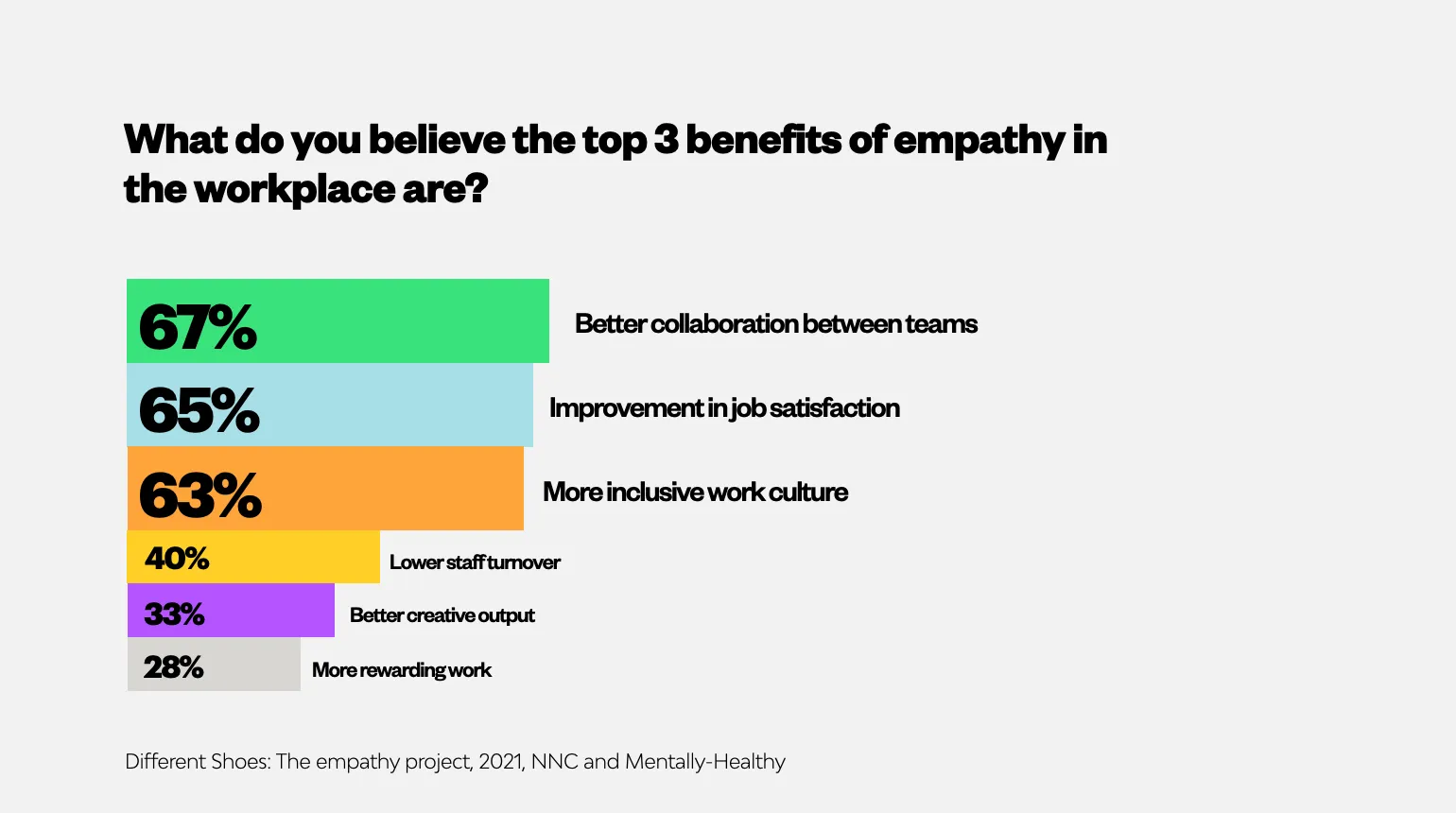
BARRIERS TO EMPATHY
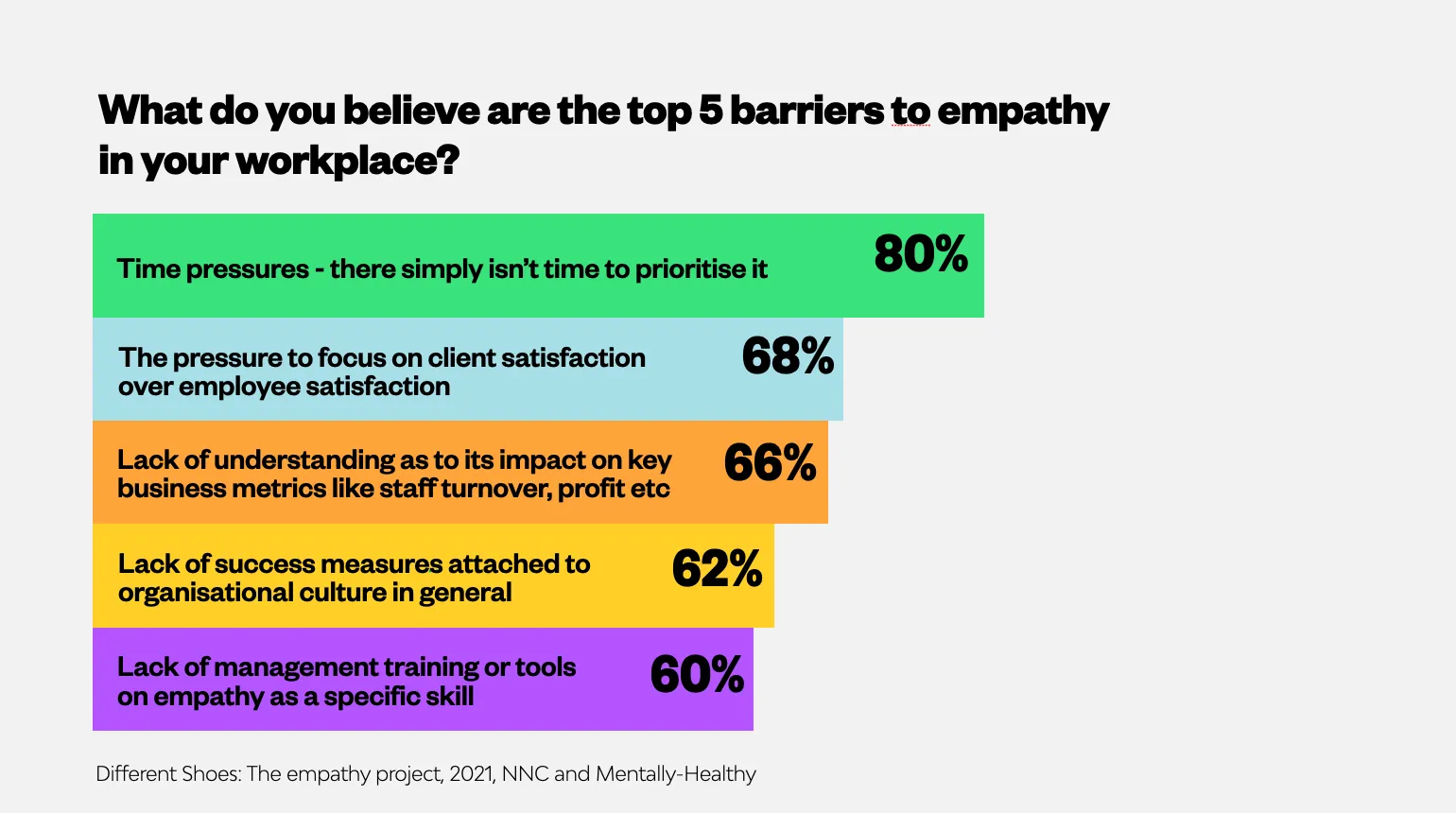
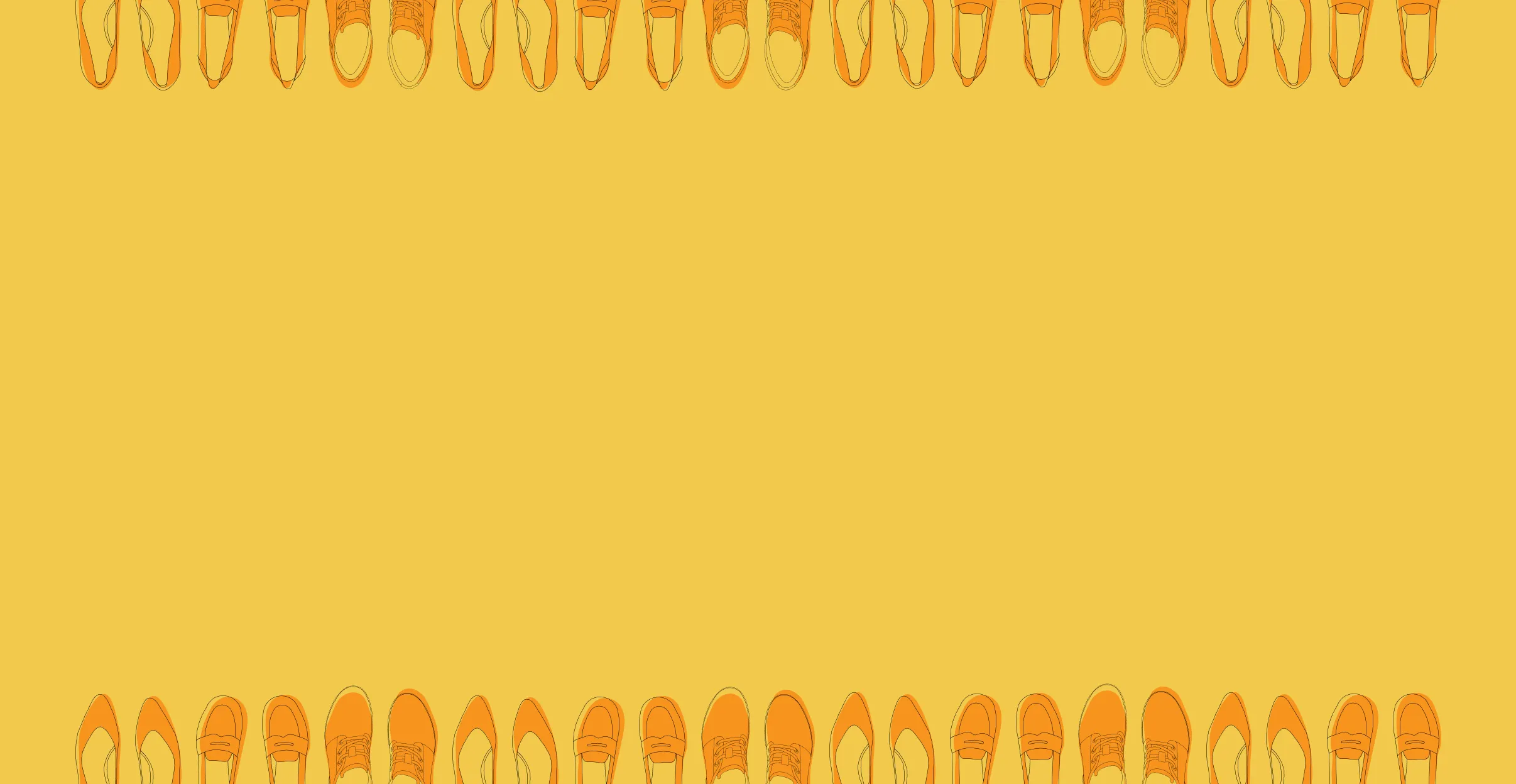
If we know that being more empathetic in the workplace will have greater outcomes for the business and its people, what's stopping the industry from being more empathetic?
focus on EMPATHY
The focus on mental wellbeing by business leaders has improved since Never Not Creative and Unltd came together to form the Mentally-Healthy Change group in 2018. However, responses were mixed when it came to the experience of empathy within our workplaces. Although the data tells us empathy is personally important to employees and that leaders genuinely wish to care for their people, it appears respondents are not always seeing empathetic intentions modeled because often 'the business comes first'. Indeed, the stronger the belief that a business puts profit first, the stronger the likelihood for people in the company to want to leave.
MIND THE GAP
So who are the most empathetic people in the industry? Our teammates and in most cases our direct managers. Those who know us the best and that we’re likely to spend the most time with. Indeed, those groups average a 3.9 out of 5 in a rating of ‘overall how empathetic to your needs are the following people?’ In comparison, the least empathetic people were seen to be clients and suppliers at 2.8 and 3.1 out of 5 respectively.
The findings show that although leaders in our organisation have good intentions of maintaining mentally healthy workplaces, their visions aren’t being carried on through the organisation. There is a gap in the empathy levels leaders think they are displaying, vs what middle managers and juniors are experiencing.
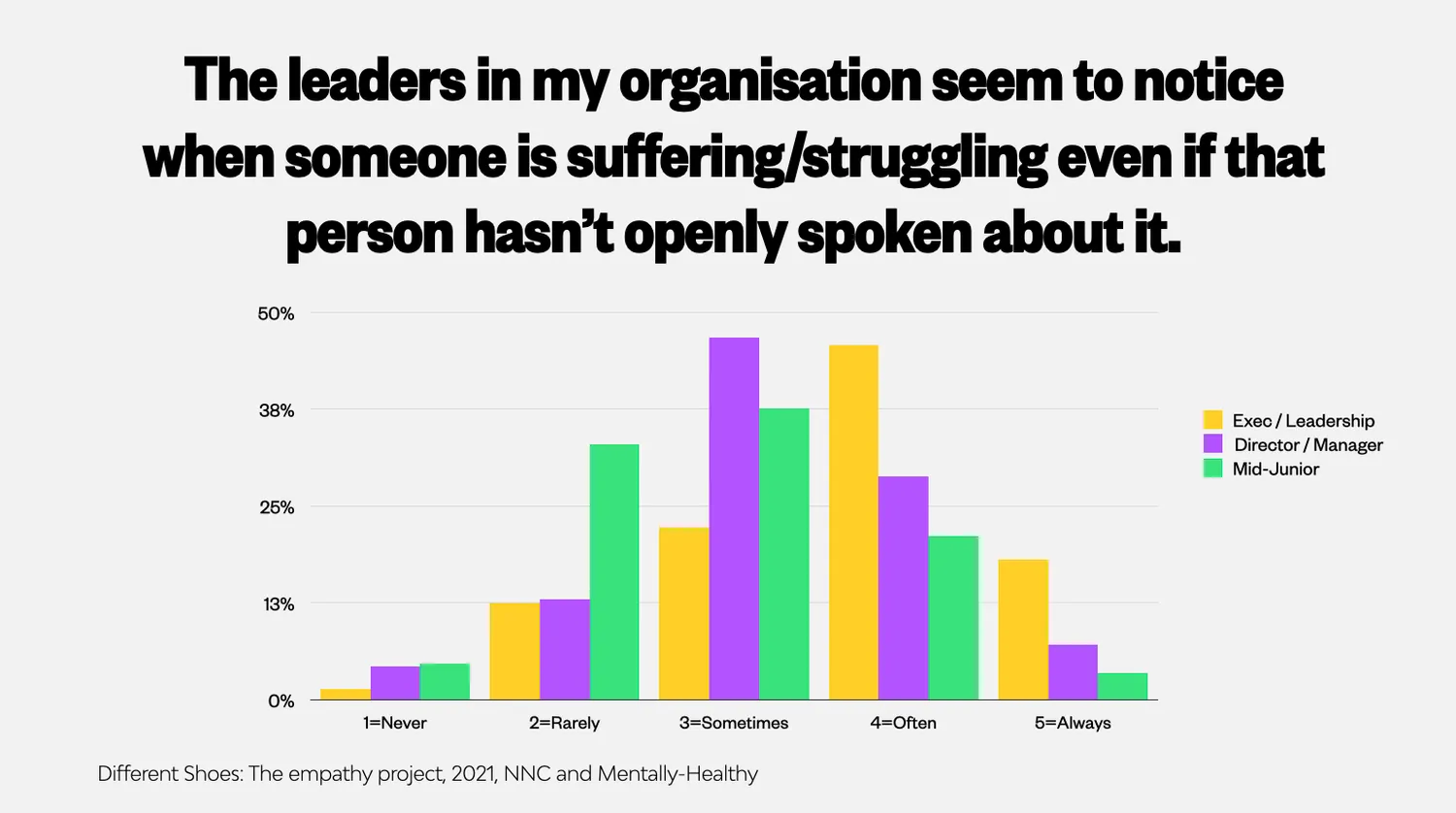
The data infers that leaders need to do more to address this gap than has been created by good intentions. It’s a topic that their employees believe is essential and it would be a huge opportunity lost if it was to end up perceived as paying ‘lip service’ to the topic. Time is running out for businesses that aren’t going beyond a ‘box-ticking’ exercise towards empathy and mental health and becoming active in listening, supporting and understanding the needs of individuals.
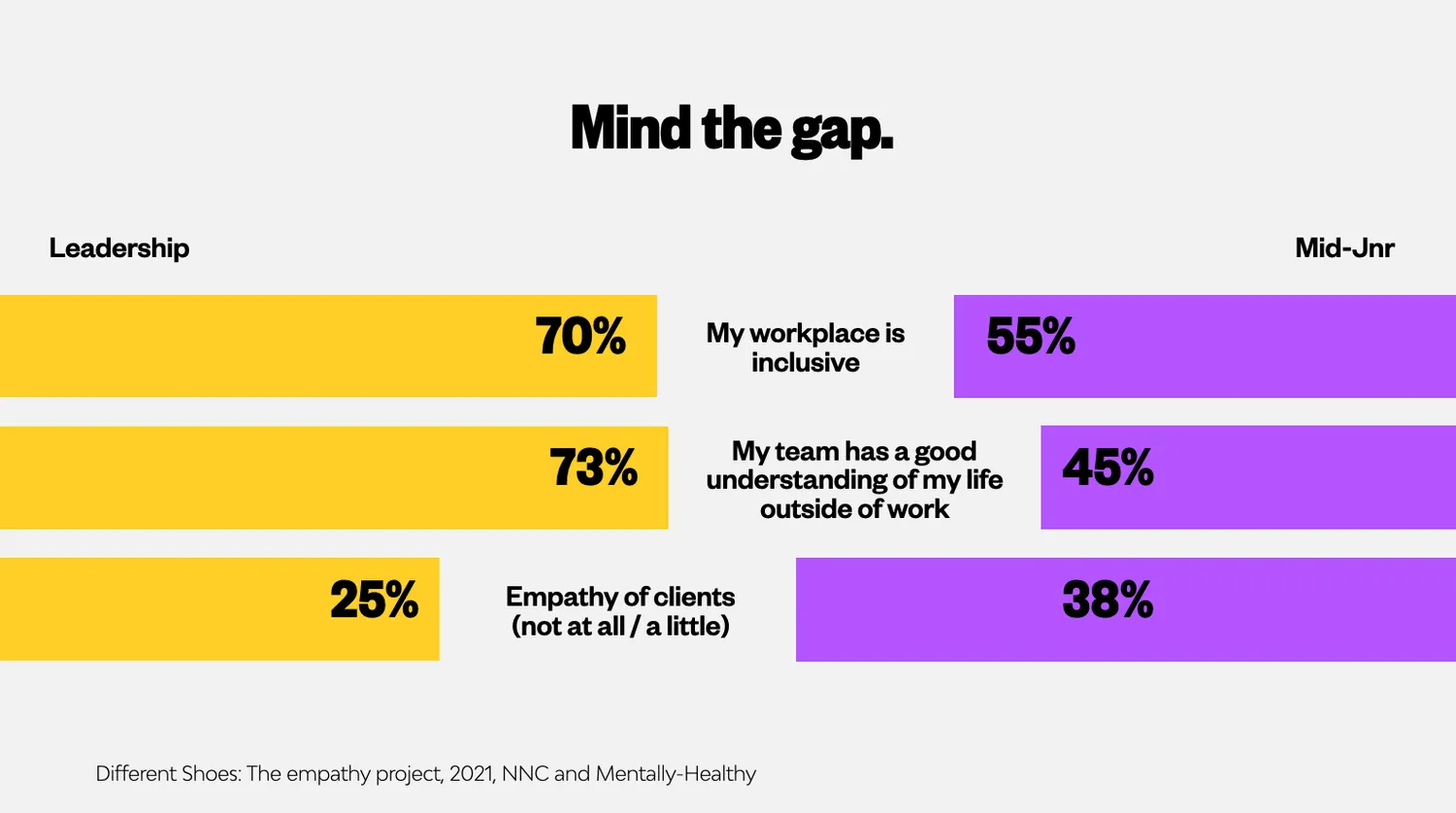
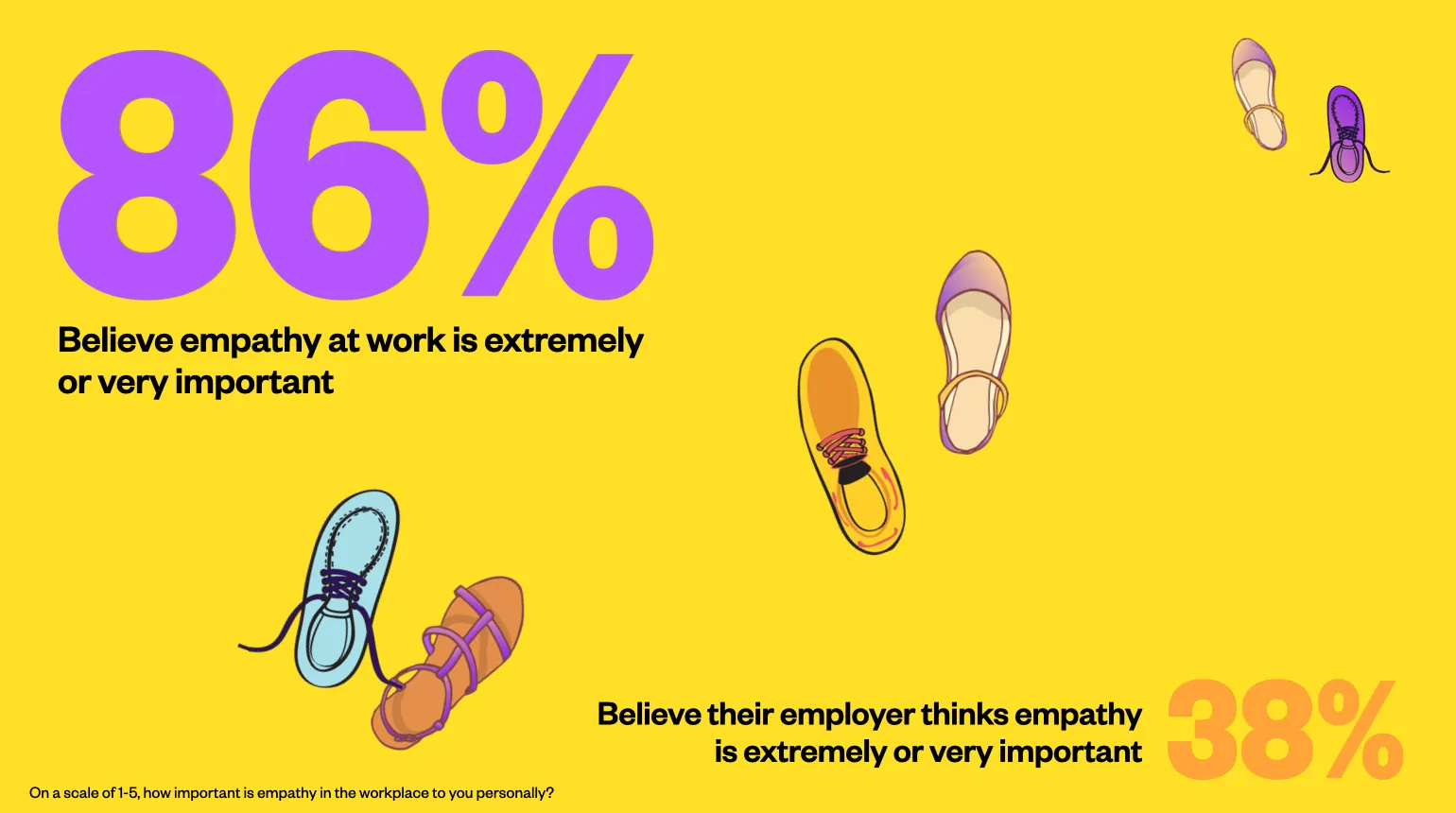
EMPATHY’S EFFECT ON STAFF TURNOVER
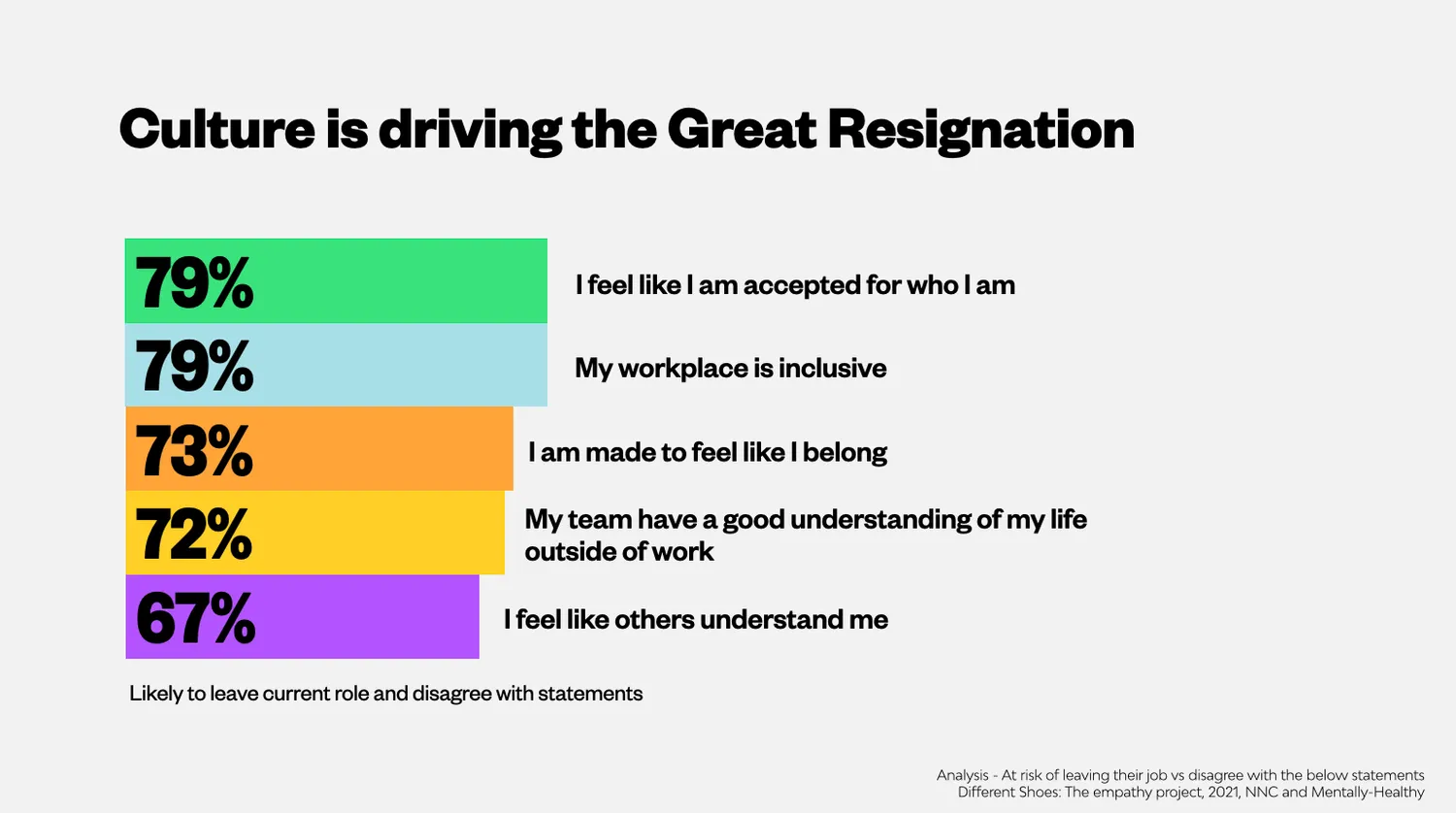
For too long, the standard response to addressing the threat of someone leaving an organisation has been to throw money and titles at the problem. While of course it’s always nice to earn more and be rewarded for all their hard work, it also can have a negative effect on our industry’s culture and wellbeing. Leader’s promoted to positions where they’re responsible for people without any experience, training, guidance on what’s expected of them. It piles the pressure on the expectations of themselves (as observed in our Mentally-Healthy studies in 2018 and 2020) and only serves to pass that pressure onto those around them.
This has further impact on individuals looking elsewhere for a culture they fit into, or a manager / leader they want to work for. You see, while the money and the title is nice, it’s a short-term fix. We found a significant connection in the study that impacted on our likelihood to leave a job in the next 12 months – culture and belonging.
We crave acceptance, workplaces that are inclusive, a feeling of belonging and an understanding of our lives outside of work. These cravings have undoubtedly been impacted by the pandemic and remote working, where communication has become even more focused on transactional tasks, occasions and getting shit done, and less on ‘catching up’ or ‘going for a coffee.’ Spending time on these areas would most likely decrease the likelihood of staff wanting to leave their roles.
FROM LACKING IN… TO FULL OF… EMPATHY
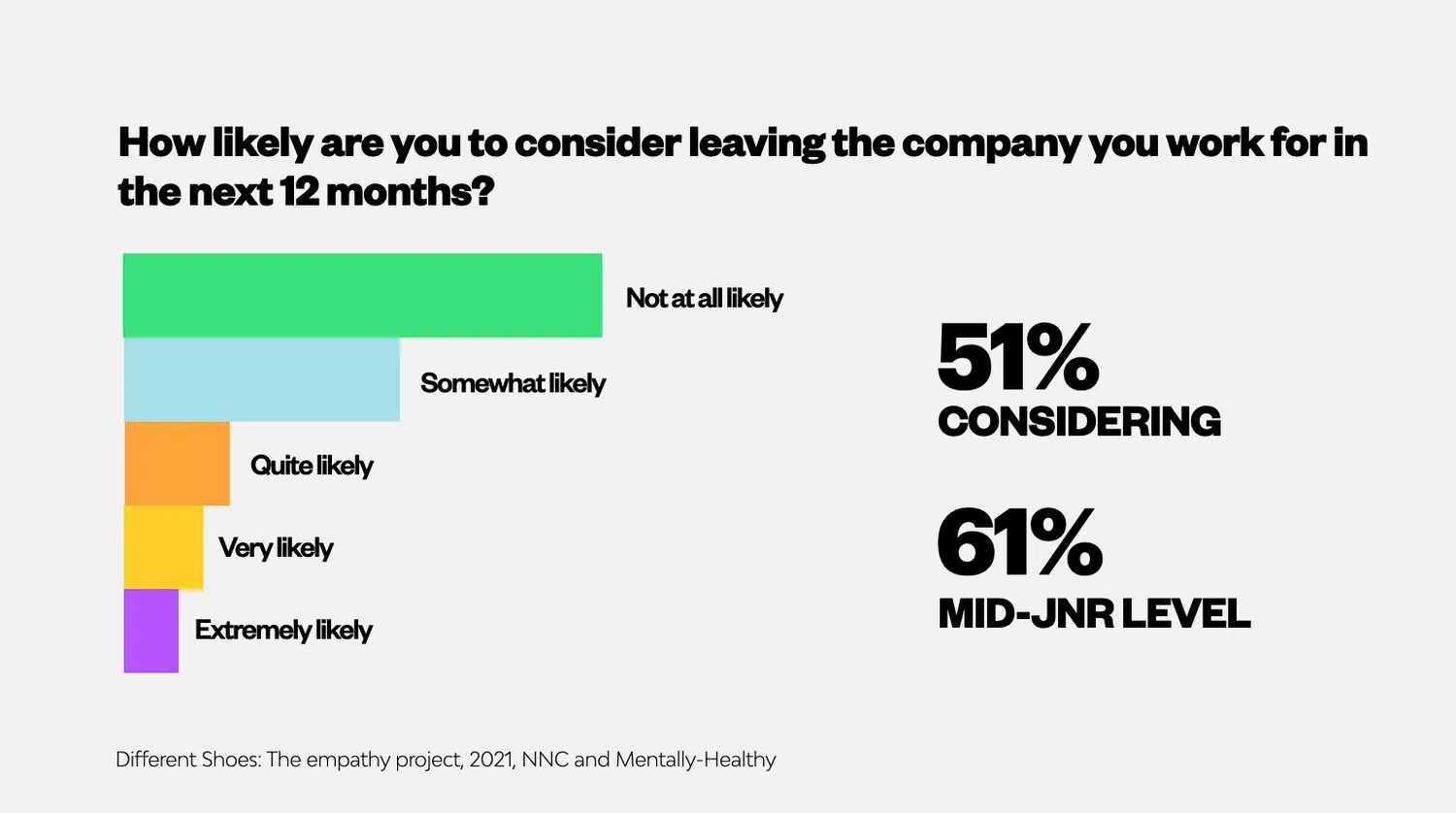
Leaders would also be well-advised to address the topic with their external stakeholders (clients, agencies, vice-versa). The responses in the survey had plenty of examples of situations lacking an empathetic handling of situations that were opportunities for empathy overload.
Like the participant who was rushed to hospital after a client party, only to be sms’d by the client at 7am the next morning to request the plan on how deadlines would be hit while they were ‘off’. Or the client that told their account manager that their ‘life had been ruined’ because of a courier arriving ten minutes after a print deadline. Then of course, there’s destruction of empathy from within. One respondent shared that their manager told them -
"Stop being dramatic! you're not burnt out, I know what burnout looks like – we just need to get through this.”
Thankfully, we asked for what they would rather have received as a response.
So in case that was you and you were wondering…
“You're clearly being affected by this situation so let's talk about how we can reduce the stress involved. If you're feeling burnt out you have the right to take time to recover. There will always be deadlines but your health is more important.”
Despite the best intentions of leaders, the gap exists. And in many cases it’s managers that are stuck in the middle, unable to deliver on the expectations of their leaders, and unable to practice the empathy craved by their teams. Middle Managers were more likely to believe that empathy was important as a staff retention tool, were more likely to believe empathy was not significantly important to their organisation, and more likely to be looking to leave their organisation. We haven’t created the culture and practices to help these people and in turn to help empathy and mental wellbeing to thrive.
BREAKING THE CYCLE OF UNREQUITED EMPATHY
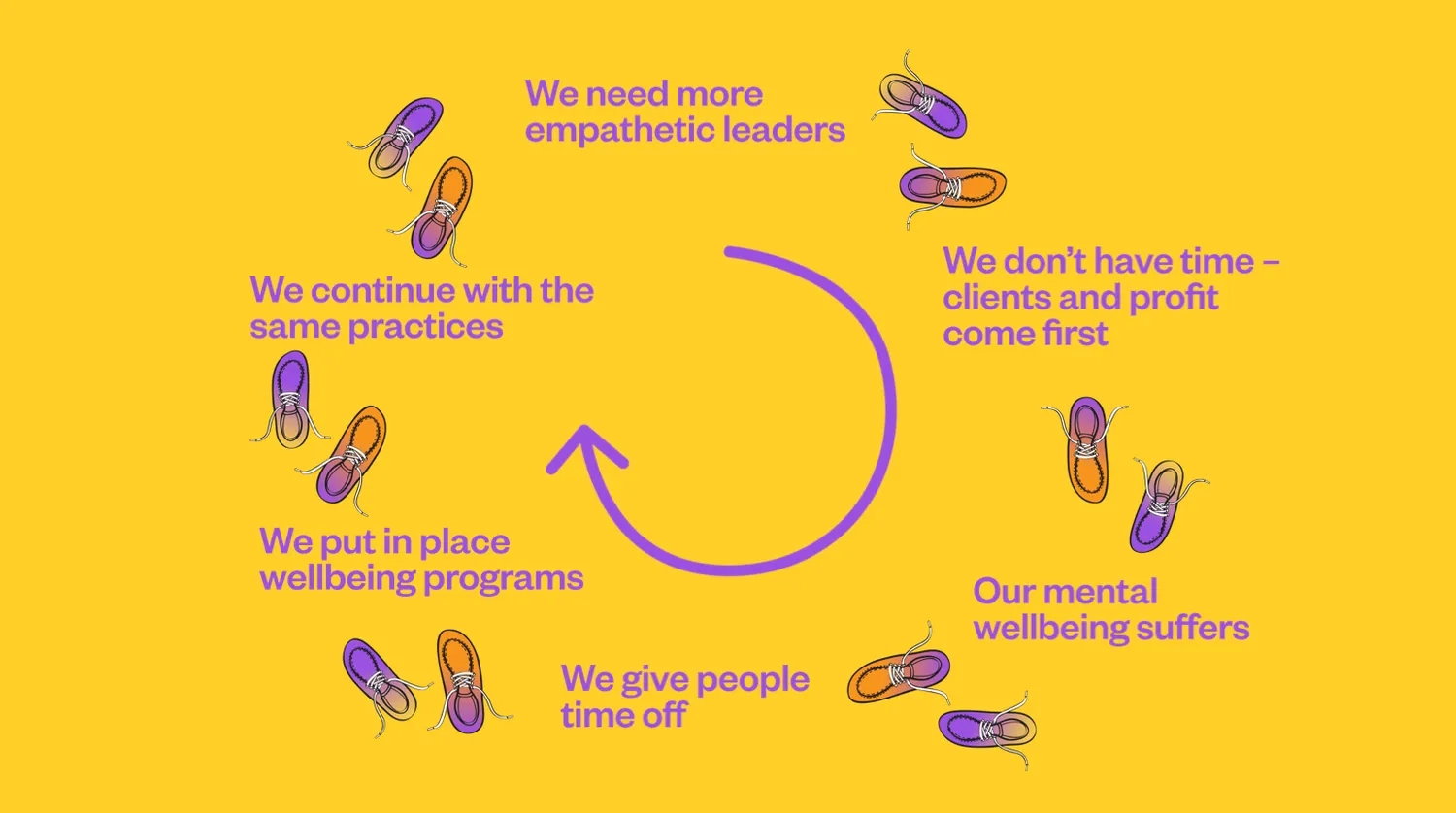
If leaders would like to see improvement in this space (and we truly believe they would) then they need to break the cycle of unrequited empathy (yes, we made that up - but it’s got a nice ring to it)!
We’ve been told that we ‘need more empathetic leaders’ but we’re grappling with the dynamics of having to put ‘clients and profit first.’ ‘Our mental wellbeing suffers’ as a result. In a desperate attempt to make things better ‘we give people time off’ and put in place things like ‘wellbeing programs’, meditation sessions, EAP’s (Employee Assistance Programs) but it’s all in vain… if ‘we continue with the same practices’ that got us to this point in the first place. We have to break this cycle.
One response that pretty much summed up the gap between intention and execution was this:
“Sorry, I know they are stacked and struggling but I really need them on this, they are the best people for the job.”
For a micro-second there was a smither of empathy in this response, but it was wiped out with the introduction of the word ‘BUT.’ In fact, as Brene Brown explains, as soon as you words and phrases like ‘but’ or ‘at least’ you’re only practicing sympathy, and unfortunately that’s not getting us anywhere.
BUT is oiling the cogs of our unrequited empathy cycle and stopping empathy in its tracks. BUT says I care, but I don’t. BUT says we’ll change in the future, but we won’t. BUT says it will be different tomorrow, but it never is.
WHAT DO OUR LEADERS HAVE TO SAY?
As part of the study we reached out to leaders across various creative, media and marketing organisations. Our aim was to flesh out examples in order to share the many ways that leaders ARE attempting to embed empathy into their workplaces.
Thierry Lalchere from Havas shared many examples and lots of practical advice in our launch event in Sydney. One of our favourite pieces of advice (of which there were many) was the phrase, “Listen to hear, don’t listen to respond.” A clear indication that to be truly empathetic we have to go beyond listening to proactively acting on what we hear.
Thierry also spoke of a related theme in the idea of resilience. It’s so often mentioned alongside empathy and mental wellbeing. Thierry had a less conventional take than the expected ‘personal resilience’ that we’re all expected to develop. Thierry explained that resilience is a system. A system that’s built around you to help navigate challenges, change and overcome adversity and uncertainty. It’s people, peers, colleagues, friends, family as well as processes and practices that you can rely on for support. It goes without saying that it’s a system that requires empathy in its foundations.
“Human and helpful" was a term coined by Rachel Page at Yahoo, and perfectly describes not only their commercial approach, but their approach to empathy in the workplace. To Rachel, empathy is about so much more than initiatives, it's about walking the talk every day with individuals. From senior leadership team meetings to one-on-ones, she stresses the importance of embodying empathy through consistent action.
So how do you show up with empathy? According to Rachel, the first part is about showing up with non-judgement. An open mind and open ears. Secondly, she says it's vital to understand you’re dealing with whole people. "You get the package when you get the person."
Rachel’s colleague Justin Orchard also shared the importance of embodying empathy, this time through vulnerability. He tries to lead by example, being vulnerable with his team, because of the positive effects it has on helping dissolve the barriers to sharing for others.
During the height of the pandemic, he took a few days off to prioritise his mental wellbeing. Being honest with his team about it was key. He says that it was an important moment for him, helping people realise, “Well, this is normal. Justin has told me he's taking time off because he's not feeling it. I can do that as well. And I'm going to talk to him about that.”
Vulnerability was a theme that resonated with Paul Cotton from Jack Morton. We get our best results when everyone goes on the journey together and we reveal our thinking, the highlights and the mistakes. And I think that openness creates a lot of opportunity for other people to be open with you - which as a creative is exactly what you want!
There was an example recently where the pressures and stresses of work caused empathy to take a back seat. Luckily Paul was self-aware enough to notice when it happened and to learn from the moment.
“A team mate mentioned that they'd been told I was the go to person for something pretty rudimentary - and for whatever reason, it struck a nerve with me and I replied in an uncharacteristically harsh fashion that if someone needed me to do X thing, then we have some general intelligence issues at play here.
...at which point my team mate admitted that actually they were the one who didn't know how, and needed a hand. And I immediately regretted being snippy. I didn't engage my brain and take the time to read between the lines, understand what was going on and respond in a helpful way. I was the dumb one.”
Paul shares that it’s the trust, openness, empathy equation that helps to build the right kind of confidence. The confidence to explore ideas and fumble and experiment, which all lead to better work. The confidence that can help empathy to thrive rather than stifle it. ‘We know the best work is built in collaboration, and collaboration is best built on a foundation of empathy and understanding each other.’
Similarly to Paul’s example, Stephanie Douglas-Neal from PHD shared that sometimes we all struggle with what’s happening personally which can impact on our ability to empathise. ”It feels like we don’t have the emotional energy to think about anybody else.” Living our work lives on Zoom for the past few years hasn’t helped either… “On your screen at home, you only think about what’s happening in your world. If you can’t sit next to someone and see how they are as another human being, it’s harder to connect with them as a person.”
As our report uncovered, time is a major barrier for people in being able to practice empathy. But for Stephanie it’s a key issue to overcome, and it’s invaluable to every business. “Leaders just need to take a moment to realise that their teams are experiencing things that they didn’t experience. And the only way for them to genuinely understand that is to take that time out and spend a couple of hours a week talking to people and understanding how they’re going.”
IN CONCLUSION
Empathy is the super power that we’ve been looking for to tackle many of the mental wellbeing and talent shortage issues that the creative, media and marketing industries have been facing for some time.
While we need to make more effort to make time to prioritise empathy, we also need to build empathy into our daily processes, routines and work relationships. From starting meetings with “how are you?” to supporting new managers with the guidance and training they need to do the job they’re about to do – not just getting paid more for doing the job that they HAD been doing.
It’s time for leaders and employers to recognise and reward the right behaviours. Too often we praise the late nights, the long weekends and the “going above and beyond.” But all we’re doing is highlighting the behaviour that gets you praise. We’re reinforcing the cycle. It’s time to reward the supportive behaviour, the people thriving at work and in life, outside of work achievements, and the looking out for each other that can often happen everyday, but that ironically, goes unnoticed.
Finally, to break the cycle, we need to say no to ‘BUT’. No more “I know they’re really stacked BUT I really need them on this.” No more, “I know you’ve got that family thing tonight BUT I just need you to stay back one more time.” No more, “We’re working on improving the way we work with this client BUT in the meantime we just need to suck it up and keep going.”
Every time we say BUT our empathy becomes nothing more than sympathy at best, and dismissive carelessness at worst.
Empathy is the opportunity to take another significant step to improving our mental wellbeing AND the attractiveness of the industry that we’ve known and loved for so long. An industry that can rip us apart but that can build us back now better than ever before.
